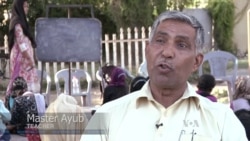Arguing about education with Pakistani children who don't attend school has become his hallmark. Master Mohammad Ayub, the title now a permanent part of his identity, was an Islamabad firefighter who made it his business to teach any child who could not go to class.
He started with one child in 1982.
"I saw you cleaning cars all day. Why didn’t you go to school?" Ayub asked a boy he had been watching for a couple of days.
The boy responded that he was an orphan with five brothers and three sisters. That struck a nerve. Ayub himself had been an orphan with five brothers and three sisters.
"When my father died, everyone who came to the funeral said they were sorry, but no one helped," Ayub remembered.
He sold newspapers, bound books, glued paper envelopes – anything to make enough money to pay for his siblings to continue their education. At night, he would study.
Ayub wanted to help the young boy who washed cars but did not make enough money to pay for lessons. So he offered to teach the boy for free.
One boy became a few, then dozens. Today, Ayub runs a makeshift school in a public park in Islamabad. Many of his students come from nearby slums.
Some go to regular schools in the morning but come to him for help with homework. Others have never been to school. Thousands of poor children have benefited from his services over the years.
‘An education crisis’
Ayub’s story is heartwarming, but his efforts only highlight what one local nongovernmental organization, Alif Ailaan, calls "an education crisis of unprecedented proportions."
Pakistan has the world’s second-worst number of out-of-school children, exceeded only by Nigeria. Nearly half of the country’s school-age children – almost 25 million – do not attend classes.
Most of those who do go to school receive a poor education. Data collected by another local NGO, Annual Statistics of Education Report (ASER), show nearly half of all fifth-graders are unable to solve a simple, two-digit math division problem or read a story in their local language.
Another report, issued recently by the Islamabad-based Institute of Social and Policy Sciences, said the country’s education expenditure is the lowest in South Asia.
At the launch of this the report, Minister of State for Federal Education and Professional Training Mohammad Balighur Rehman was heartened by "a visible increase in education budgets for all the provinces in 2015-2016," and encouraged a "healthy dialogue" on the state of education.
Meanwhile, Master Ayub is not waiting for the government to fix a broken system. He has taken matters into his own hands.







